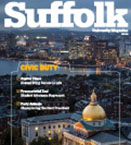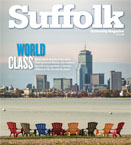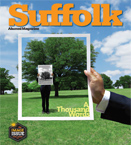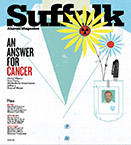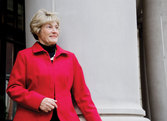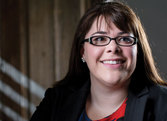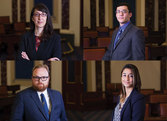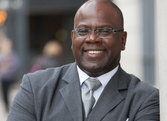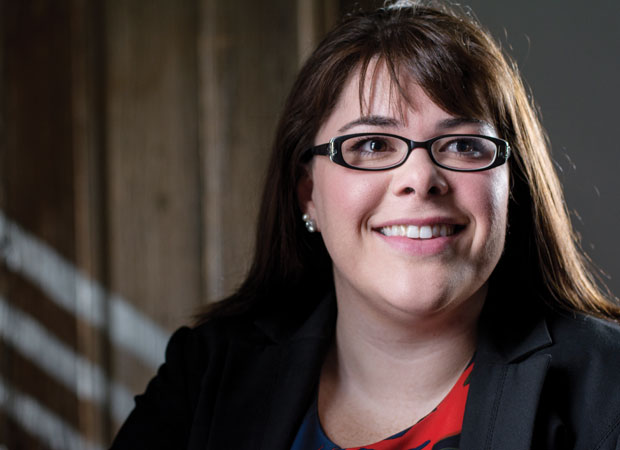
Home Court Advantage
Drawing on her own background gives Jessica Drew JD ’16 even more empathy for her clients
By Alyssa Giacobbe
Jessica Drew JD ’16 was 12 when she argued her first case. It was about politics—and took place in her sixth-grade classroom—but the win, she says, was still sweet. “My mom used to call me her jailhouse lawyer,” she says. “I was always getting people out of trouble, always arguing some cause. My parents will tell you they knew I’d become an attorney,” even if the odds weren’t entirely on her side. She grew up working-class in Massachusetts and moved around after her parents divorced. “We didn’t have a lot of money,” she says. “My dad was a janitor. My mom had me at 19. People told her, ‘You’ll be lucky if your kids graduate high school.’”
Now with a newly minted JD, Drew has made beating the odds a personal passion, and not just when it concerns her own life. As an undergraduate at the University of Tennessee in politically conservative Knoxville, she became a champion for LGBT rights both on and off campus, learning how to argue compellingly and passionately, and letting reason prevail over emotion. It was rarely easy, and she wasn’t always successful—which made the work especially good preparation, she says, for a career in law. “People could be really hateful,” she says. “I tried to understand where they were coming from and then use that to make my case. I tried to be rational even when they weren’t. But I also learned that some people will never change, and you have to accept that, too.”
After taking a few years off to save money and study for the LSATs, Drew enrolled in Suffolk Law School. She was awarded two scholarships which made the offer of acceptance one she couldn’t refuse—the need-based Honorable Lawrence L. and Barbara G. Cameron Scholarship and the merit-based Trustee Academic Scholarship. Being back in the Boston area also allowed her to be near family, including her father in Plymouth, with whom she lived to save money.
At Suffolk, her interest in social justice deepened as she began to apply the law to her advocacy work. Drew volunteered for Veterans Legal Services, an organization that provides legal assistance to indigent and homeless vets, and joined the staff of the student journal Bearing Witness, whose mission is to raise awareness of how the law can help create a more compassionate and just society. After her second year, at the suggestion of a friend, she applied for an internship with the City of Boston’s Office of Fair Housing & Equity, which works to help identify and counteract discrimination to ensure citizens have equal access to housing and employment. “I fell in love with the work,” she says. “You don’t understand how important housing is until you don’t have it, but you have to have a place where you feel safe before you can do anything else. Everyone has a right to housing, and discrimination is one of the ways we limit people’s right to it,” whether by refusing to rent to a family with small children or to someone on housing assistance. “I’d hear, ‘Those people can be dirty.’ Or, ‘They destroy things; I don’t trust them.’ It’s classism, it’s racism. And it’s against the law.”
That work continued when she enrolled in Suffolk Law’s Accelerator Clinic, the University’s in-house law practice that represents low- and moderate-income clients facing eviction, discrimination, and other housing issues while also providing law students with hands-on training. Under the supervision of Suffolk Professor William Berman, the program’s managing attorney, students work cases from start to finish, often appearing on their clients’ behalf before various authorities, including the Massachusetts Commission Against Discrimination, the Boston Fair Housing Commission, and Boston Housing Court. In a recent case, Drew worked with a family whose teenage daughter had a baby. “The landlord discovered the child and conducted a lead inspection,” she says. When it turned out that lead was, in fact, present, he evicted the family. “The law says that if there’s a child under the age of six in the house, there can’t be lead,” she says. “But what so many landlords don’t understand, or don’t want to understand, is that they can’t kick the family out or refuse to rent to them in the first place. You can’t pick and choose whom you rent to based on whether or not the person has children. You have to get rid of the lead.”
Working as part of a team of four students, Drew helped the family reach a fair settlement. “The Accelerator Practice teaches students how to handle cases in the justice gap, and to work with those who can’t afford legal care,” says Berman. “These types of cases resonate strongly with Jessica, and she puts herself into them full force. She’s extremely passionate and a great advocate.” Fellow Accelerator Practice student Arturo M. Balcazar JD ’16 met Drew when both attended Suffolk Law’s Summer in Sweden program. “We’ve since had many conversations about social justice and the role that attorneys can play in helping communities in need,” he says. “As a student, it’s definitely motivating to have a class-mate who is as hard-working, passionate, dedicated, and committed to social justice as Jessica. She’s willing to put in the work needed to advocate for her clients, and she truly cares what happens. I’m sure that she’ll bring a lot of positive change.”
After graduation, Drew continues work-ing with the under-represented as well as the elderly as an AmeriCorps legal fellow at South Coastal Counties Legal Services. “People who have been ostracized or have had difficulty accessing the justice system still have important stories to share and lives to carry on,” she says. “Sometimes legal problems are the problems that keep them from housing, a job, stability. I want to be the person who can help them.” Her upbringing is a big reason she believes that she can. “If you understand what it’s like to struggle, you understand where your clients are coming from,” she says. “And you can advocate better. It’s like, I know where you’ve been, and I know how hard it is, and because of that, I will do everything in my power to help you.”
pop quiz
Last book I read: Possible Side Effects by Augusten Burroughs. Album I’ve got on repeat: Talking Is Hard by Walk the Moon. Favorite “Only in Boston” experience: Catching a Sox game at Fenway Park—one of my favorite places in the entire world. Words to live by: We make a living by what we get, but we make a life by what we give. Role models: My mom and my two grandmothers. When I’m not working or studying: I’m enjoying “whine and wine” nights with my friends. Dream destination: New Zealand.
Photograph by Mark Wilson
